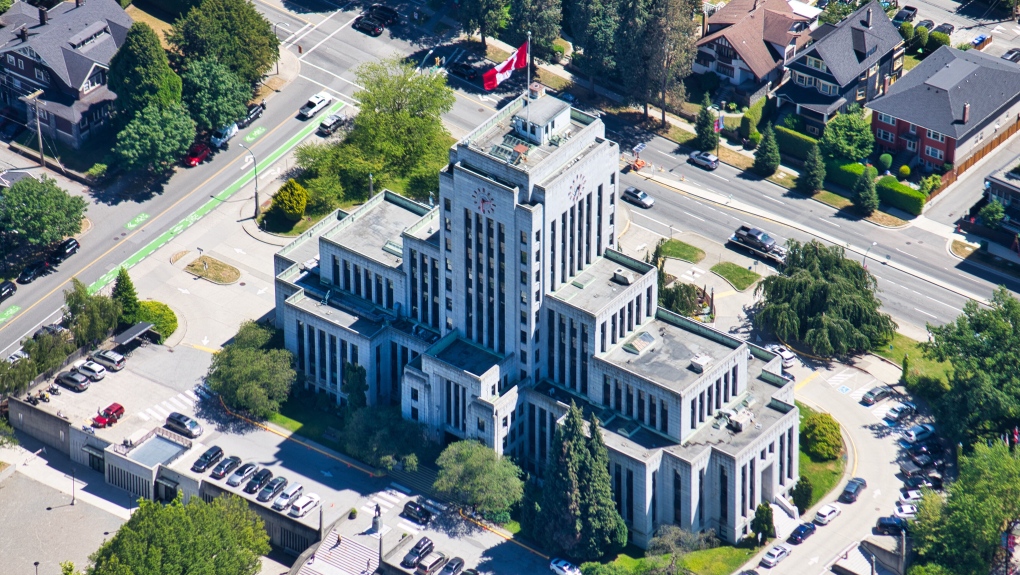Vancouver to apologize to Italian-Canadians for WWII treatment
 Vancouver City Hall is seen in June 2019. (Pete Cline / CTV News Vancouver)
Vancouver City Hall is seen in June 2019. (Pete Cline / CTV News Vancouver)
An official apology to Vancouver's Italian-Canadian community for injustices suffered during the Second World War will be issued by the city.
Council approved a report from staff, including a draft of the apology Tuesday. It will be made in June, Italian Heritage Month.
"Council’s motion to issue an Official Apology to Vancouver’s Italian-Canadian community is further demonstration of the city’s commitment to upholding the principles of human rights, justice and reconciliation," the report says.
"The Italian Canadian community is among the multiple communities that have historically experienced stigma and discrimination due to their cultural identity and place of origin."
An overview is provided of the "actions, policies and/or public support of measures" that discriminated against the community between 1940 and 1945 is provided, along with testimonials of those who lived in Vancouver at the time.
In 1940, after Canada declared war on Italy, the federal government directed the RCMP to "round up" anyone believed to be associated with the Fascist Party, the report explains, noting none of these men was suspected of a specific crime, but that they were classified as "enemy aliens."
Thirty-three men from Vancouver were listed by the RCMP, and on June 10, 29 were arrested. Further arrests followed with the men being interned in prisons in Ontario and Alberta for an average of 15-and-a-half months despite. None were ever charged.
At the same time, between 1,300 and 1,800 others who had arrived in Vancouver from Italy after 1922 were required to register with the police and report to headquarters monthly.
"The impacts were not isolated to individuals alone and were detrimental. The people interned were men, many who were forced to abandon their families, in many cases including young children, businesses, and entire livelihoods," the report reads.
"In addition to the economic hardships that many families experienced because their breadwinners were taken away, the stigmatization, humiliation, and shame experienced due to being targeted and having to report to the government on a regular basis remained for several years after the war ended."
The report notes that none of the men interned are still living, but says an official apology is important to their descendants and the broader community. In addition to a formal apology, staff recommended council consider how to expand education about the experiences of Italian Canadians, including a public art installation.
CTVNews.ca Top Stories

Trudeau appears unwilling to expand proposed rebate, despite pressure to include seniors
Prime Minister Justin Trudeau does not appear willing to budge on his plan to send a $250 rebate to 'hardworking Canadians,' despite pressure from the opposition to give the money to seniors and people who are not able to work.
'Mayday!': New details emerge after Boeing plane makes emergency landing at Mirabel airport
New details suggest that there were communication issues between the pilots of a charter flight and the control tower at Montreal's Mirabel airport when a Boeing 737 made an emergency landing on Wednesday.
Hit man offered $100,000 to kill Montreal crime reporter covering his trial
Montreal news outlet La Presse says a hit man offered $100,000 to have one of its crime reporters assassinated.
Cucumbers sold in Ontario, other provinces recalled over possible salmonella contamination
A U.S. company is recalling cucumbers sold in Ontario and other Canadian provinces due to possible salmonella contamination.
Trudeau says no question incoming U.S. president Trump is serious on tariff threat
Prime Minister Justin Trudeau says incoming U.S. president Donald Trump's threats on tariffs should be taken seriously.
Insurgents breach Syria's second-largest city Aleppo in shock offensive
Insurgents breached Syria's second-largest city Aleppo after blowing up two car bombs on Friday and were clashing with government forces on the city's western edge, according to a Syria war monitor and fighters.
Here's how thick ice needs to be to park a truck on it, according to Sask. Water Security Agency
The Saskatchewan Water Security Agency (WSA) says ice should be at least one foot (30 centimetres) thick before it's safe to drive a car or light truck on a frozen body of water.
Democratic lawmakers from Connecticut report Thanksgiving bomb threats against their homes
At least six Democratic members of Congress from Connecticut were targeted by bomb threats on their homes Thursday, the lawmakers or their offices said.
Latest updates: Tracking RSV, influenza, COVID-19 in Canada
As the country heads into the worst time of year for respiratory infections, the Canadian respiratory virus surveillance report tracks how prevalent certain viruses are each week and how the trends are changing week to week.
































